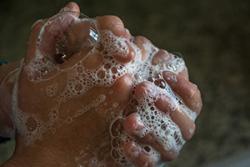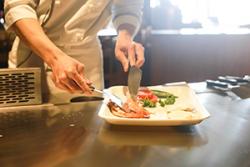Chefs and home cooks are rolling the dice on food safety
![]() This article by Paul Cross, Senior Lecturer in the Environment, School of Environment, Natural Resources & Geography Bangor University and Dan Rigby, Professor, Environmental Economics, University of Manchester was originally published on The Conversation. Read the original article.
This article by Paul Cross, Senior Lecturer in the Environment, School of Environment, Natural Resources & Geography Bangor University and Dan Rigby, Professor, Environmental Economics, University of Manchester was originally published on The Conversation. Read the original article.
Encouraging anyone to honestly answer an embarrassing question is no easy task – not least when it might affect their job.
 Members of the public were asked to agree or disagree with the statement: I always wash my hands immediately after handling raw meat, poultry or fish;: Via PixabayFor our new research project, we wanted to know whether chefs in a range of restaurants and eateries, from fast food venues and local cafes to famous city bistros and award-winning restaurants, were undertaking “unsafe” food practices. As some of these – such as returning to the kitchen within 48 hours of a bout of diarrhoea or vomiting – contravene Food Standard Agency guidelines, it was unlikely that all respondents would answer as honestly if asked about them.
Members of the public were asked to agree or disagree with the statement: I always wash my hands immediately after handling raw meat, poultry or fish;: Via PixabayFor our new research project, we wanted to know whether chefs in a range of restaurants and eateries, from fast food venues and local cafes to famous city bistros and award-winning restaurants, were undertaking “unsafe” food practices. As some of these – such as returning to the kitchen within 48 hours of a bout of diarrhoea or vomiting – contravene Food Standard Agency guidelines, it was unlikely that all respondents would answer as honestly if asked about them.
This was not just a project to catch specific food professionals in a lie, we wanted to find out the extent to which the public and chefs handled food in unsafe ways. With up to 500,000 cases of food-borne diseases reported every year in the UK, at a cost of approximately £1.5 billion in terms of resource in welfare losses, the need to identify risky food handling is urgent.
The Food Standards Agency (FSA) is acutely aware of the problem and has instigated initiatives such as the Food Hygiene Rating Scheme (FHRS) that involves inspections and punishments following the identification of poor food handling behaviours in restaurants and eateries. However, such initiatives do not always manage to change the behaviour of the food handlers – and inadequate food handling practices frequently go unseen or unreported.
Dicing with destiny
Yet still, we were faced with the issue of getting honest answers to our research questions. So we rolled a dice, or to be precise, two of them. As part of our research, 132 chefs and 926 members of the public were asked to agree or disagree with the following four statements:
I always wash my hands immediately after handling raw meat, poultry or fish;
I have worked in a kitchen within 48 hours of suffering from diarrhoea and/or vomiting;
I have worked in a kitchen where meat that is “on the turn” has been served;
I have served chicken at a barbecue when I wasn’t totally sure that it was fully cooked.
Here, the dice rolling was part of a randomised response technique (RRT): interviewees secretly rolled two dice and gave “forced” responses if particular values resulted. If they rolled a 2, 3 or 4, they had to answer yes. If they rolled 11 or 12, they had to answer no. All other values required an honest answer.
Denying the first, or admitting to the other three statements would be embarrassing for members of the public, and could possibly lead to dismissal for professional caterers. Because they knew that a “yes” could have been forced by the interviewee’s dice roll, they were more willing to report a true, unforced, “yes”.
We were unable to distinguish between individuals who had given a forced response and those who had answered truthfully. But we knew statistically that 75% of the dice rolls would lead to a honest response and so were able to determine the proportion of the public and chefs who had admitted to performing one of the risky behaviours. We also looked at the results in terms of factors such as price, awards and FHRS ratings to find out how they associated with the practices.
Kitchen challenge
 Stock image via PixabayWhat we found from all of the responses was that it a can be quite challenging for consumers to find an eatery where such unsafe practices are absent. Chefs working in award-winning kitchens were more likely (almost one in three) to have returned to work within 48 hours of suffering from diarrhoea and vomiting. A serious cause for concern as returning to work in a kitchen too soon after illness is a proven way to spread infection and disease.
Stock image via PixabayWhat we found from all of the responses was that it a can be quite challenging for consumers to find an eatery where such unsafe practices are absent. Chefs working in award-winning kitchens were more likely (almost one in three) to have returned to work within 48 hours of suffering from diarrhoea and vomiting. A serious cause for concern as returning to work in a kitchen too soon after illness is a proven way to spread infection and disease.
Not washing hands was also more likely in upmarket establishments – despite over one-third of the public agreeing that the more expensive a meal was, the safer they would expect it to be.
Chefs working in restaurants with a good Food Hygiene Rating Scheme score – a 3, 4, 5 on a scale of one to five in England and Wales, or a “pass” in Scotland – were just as likely to have committed the risky practices, or to have worked with others who had.
We also found a high proportion of chefs across the board had served meat which was “on the turn”. This is equally worrying, as it is part of a long-established cost-cutting practice that often involves masking the flavour of meat that is going off by adding a sauce.
Meanwhile at home, 20% of the public admitted to serving meat on the turn, 13% had served barbecued chicken when unsure it was sufficiently cooked, and 14% admitted to not washing their hands after touching raw meat or fish.
That is not to say that all chefs – or members of the public – practice unsafe food handling, indeed the majority did not admit to the poor food practices. But the number of professional kitchens where chefs admit to risky behaviour is still a cause for concern and avoiding them is not easy. People opting for a “fine-dining” establishment which holds awards, demands high prices and has a good FHRS score might not be as protected, nor reassured, as they think.
Publication date: 3 July 2017
